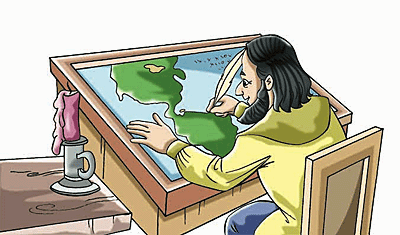grapho-, graph-, -graph, -graphy, -grapher, -graphia
(Greek: to scratch; to write, to record, to draw, to describe; that which is written or described)
As indicated at the bottom of this page, there is a significantly large number of graphic word-entry groups in this unit. Such an extensive listing is provided to show how important the grapho- element is to the English language.
The cardiokymograph has been shown to accurately record the wall motion in both animals and humans.
The cardiokymograph is also used in conjunction with the electrocardiogram during stress testing and it also appears to lead to a marked improvement in the accuracy of this procedure, providing hope that the first step to a proper treatment of a coronary heart disease with an accurate noninvasive medical diagnosis.

2. A reference to the science, skill, or work of making maps.
2. The art or technique of making maps or charts.
3. Etymology: from French cartographie, from Middle Latin carta, "paper".
Maps are graphic simplifications of reality, portraying relationships on the surface of the earth, or other celestial bodies, with points, lines, areas, symbols, colors, and typography.
Some maps are charts that display data specifically for nautical and aeronautical navigation. A map can be either two-dimensional or three-dimensional.
Related "writing" word units:
glypto-;
gram-;
scrib-, script-.


